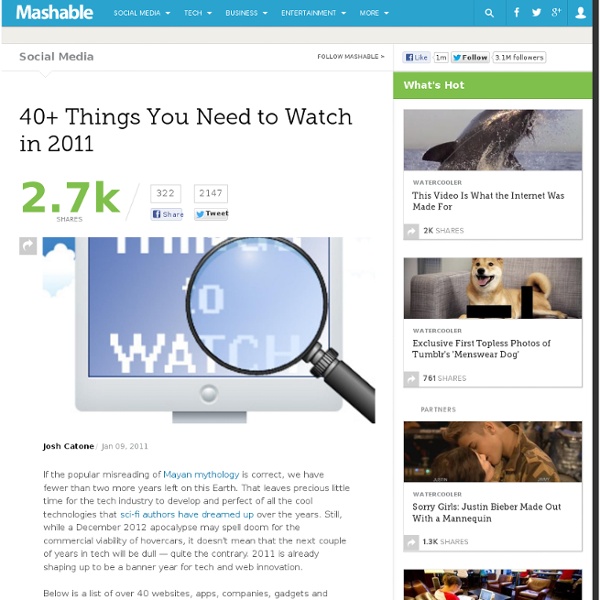World of Ends - what the internet is
30+ Accessibility Tools, Softwares & Resources for The Visually Impaired
Free ebooks are meant to be read and enjoyed by everybody regardless of physical imperfections, hence why this post is being made, although I must admit that this should be the first post that should be posted here. Having said that, do join me in the journey to increase this list of resources to make it a comprehensive one, to provide and create the proper accessibility channels. I’m sure there are other list out there which covers some of the areas below, but I do hope this post will somehow be a part of the whole effort in making this a reality. Audio Ebooks Been covered here, 35 total sites found so far providing free downloadable audio ebooks. Adobe Reader 9 Accessibility Taking note that 99% of the ebooks on this site are in PDF format, Adobe has a site dedicated specifically in providing information in greater details on making it easier for people with disabilities to read PDF files. Screen Readers (Free) One of the most obvious ones came with your copy of Windows. Other Resources
Are You Living in a Computer Simulation?
Big Internet Guide
No, really, pi is wrong: The Tau Manifesto by Michael Hartl | Tau Day, 2010
Comics, Quizzes, and Stories
The Measurement of Science
Albert Einstein’s greatest scientific “blunder” (his word) came as a sequel to his greatest scientific achievement. That achievement was his theory of gravity, the general theory of relativity, which he introduced in 1915. Two years later, in 1917, Einstein ran into a problem while trying to apply general relativity to the Universe as a whole. At the time, Einstein believed that on large scales the Universe is static and unchanging. But he realized that general relativity predicts that such a Universe can’t exist: it would spontaneously collapse in on itself. Twelve years later, in 1929, Edwin Hubble discovered that the Universe isn’t static and unchanging, but is actually expanding. The story doesn’t end there. The point of the story of the cosmological constant is not that Einstein was a fool. The problem of measuring science Assessing science may be hard, but it’s also something we do constantly. There’s a slightly surreal quality to all this activity. One metric to rule them all
100 Things Personality Test - VisualDNA
VisualDNA brings a new layer of information to the world of technology that will help bring it closer to the people who use it – making it more enjoyable and relevant. Technology provides businesses with a surfeit of DATA – what and when. However it provides very little in the way of UNDERSTANDING – who did things, and why they did them. We see this effect in all areas of business from marketing to financial services. We have a different approach. In the financial sector this approach has led to a five-fold increase in ROI, in media we have seen 35% improvement in click rates. Watch a short video about VisualDNA. Learn more about our solutions for business:
Brief Answers to Cosmic Questions
Structure of the Universe Does the Universe have an edge, beyond which there is nothing? Are the galaxies arranged on the surface of a sphere? Why can't we see the whole universe? Does the term "universe" refer to space, or to the matter in it, or to both? Evolution of the Universe Did the Universe expand from a point? More about the Big Bang When they say "the universe is expanding," what exactly is expanding? Structure of the Universe Does the Universe have an edge, beyond which there is nothing? Are the galaxies arranged on the surface of a sphere? Why can't we see the whole universe? If you could suddenly freeze time everywhere in the universe, and magically survey all of creation, you would find galaxies extending out far beyond what we can see today. Does the term "universe" refer to space, or to the matter in it, or to both? Today, the situation is reversed. Discovering the properties of space remains one of the deepest and most important problems in modern science.
Antiques, Art, Collectibles & More - GoAntiques
The end of the net as we know it | Broadband | Features
Posted on 21 Jan 2011 at 13:34 ISPs are threatening to cripple websites that don't pay them first. Barry Collins fears a disastrous end to net neutrality You flip open your laptop, click on the BBC iPlayer bookmark and press Play on the latest episode of QI. But instead of that tedious, plinky-plonky theme tune droning out of your laptop’s speakers, you’re left staring at the whirring, circular icon as the video buffers and buffers and buffers... That’s odd. Net neutrality? The free, unrestricted internet as we know it is under threat. No such thing as net neutrality It’s worth pointing out that the concept of net neutrality – ISPs treating different types of internet traffic or content equally – is already a busted flush. “We have an unbelievably good, differentiated network at all levels, with huge levels of widespread discrimination of traffic types. Indeed, the major ISPs claim it would be “unthinkable” to return to an internet where every packet of data was given equal weight.



